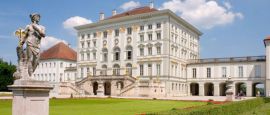Munich History
The name München ('home of the monks') stems from an early monastery founded in the 8th century. The local monasteries started the beer brewing traditions for which Munich is still renowned, and beer in its many forms is still consumed and adored by the inhabitants of the present-day city (now totalling over a million).
Never more so than during the infamous Oktoberfest, a celebration that sees the beverage consumed on an industrial level at what remains Europe’s largest festival.
By the early 16th century, Munich’s thriving population consisted of far more than just monks and those affiliated with religious orders. The city on the River Isar had established itself as an important trade centre for centuries, and the influential Wittelsbach family, who had become the city’s de facto rulers, now had ambitions to create a centre of culture and learning to rival Paris.
Theses cultural improvements included universities, libraries and museums, and would continue to be improved on for the next 400 years.
At the end of WWI, Munich became a conservative stronghold and a breeding ground for many extreme political philosophies. It was in this environment that Adolf Hitler first expounded his own early extremist views around the city’s beer halls.
Like nearly all of Germany’s major cities, Munich was bombed heavily during WWII. But unlike other German cities, the townspeople of Munich chose to rebuild and restore their precious city rather than level it and start again, and today it’s hard to imagine the city saw any damage at all.
Munich’s post-WWII rebuild laid a template for economic success, with BMW amongst others establishing their headquarters here. Today, Munich remains an energetic and economically prosperous city, with the added benefit of glorious architecture and an enviable position nestled beneath the Bavarian Mountains, all of which continue to make it a favourite spot with tourists.
Did you know?
• Many of the major roads in Munich’s old town were pedestrianised in 1972 for the Olympic Games and haven’t been converted back.
• During his days as an electrician, Albert Einstein worked at Oktoberfest in 1896. He helped set up a beer tent.
• While the Town Hall glockenspiel re-enacts two stories from the 16th century, the mechanical show wasn’t actually installed until 1908.
Do you have any Feedback about this page?
© 2026 Columbus Travel Media Ltd. All rights reserved. No part of this site may be reproduced without our written permission, click here for information on Columbus Content Solutions.




 You know where
You know where